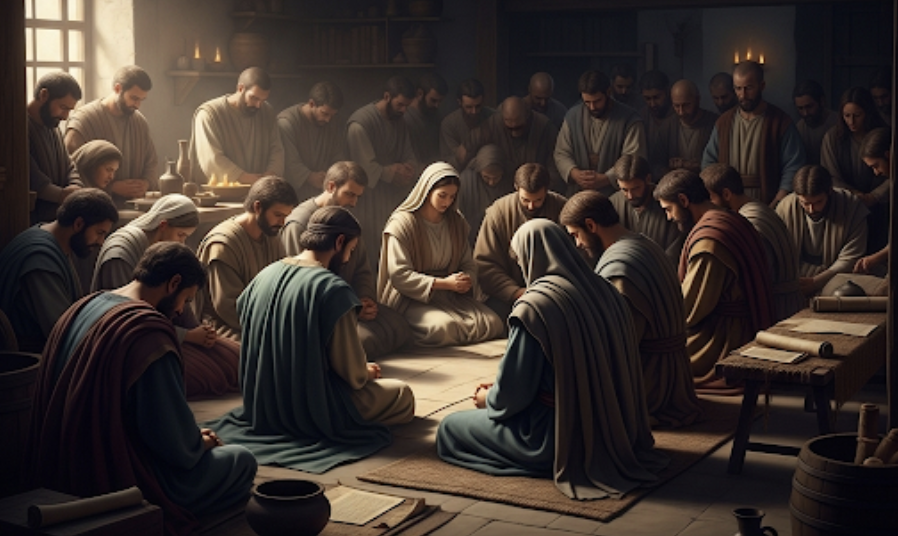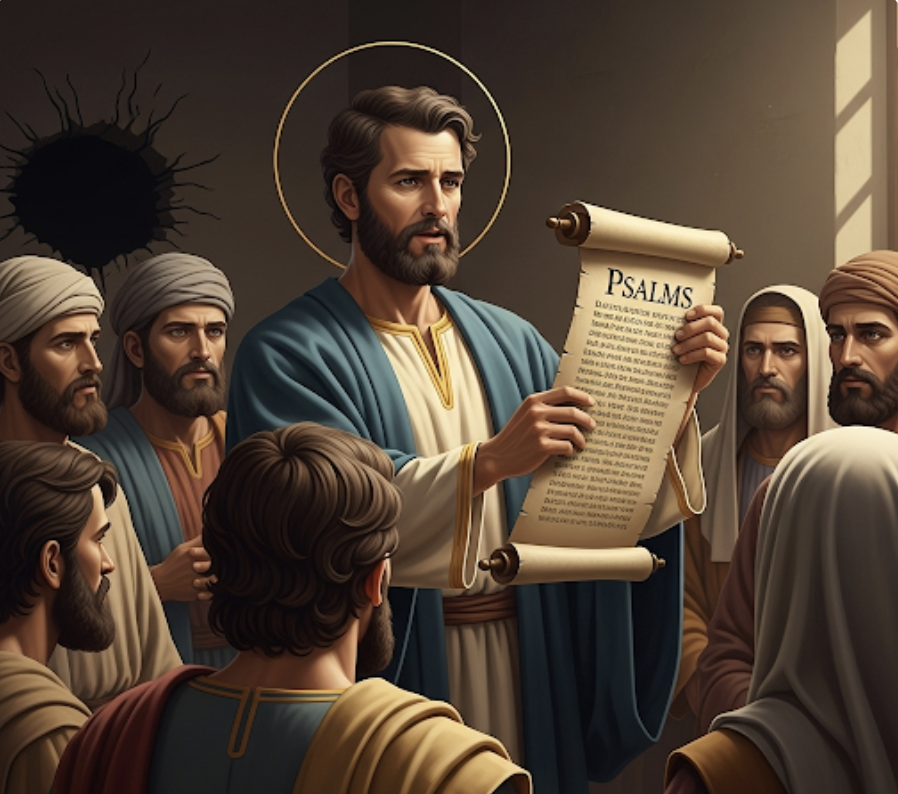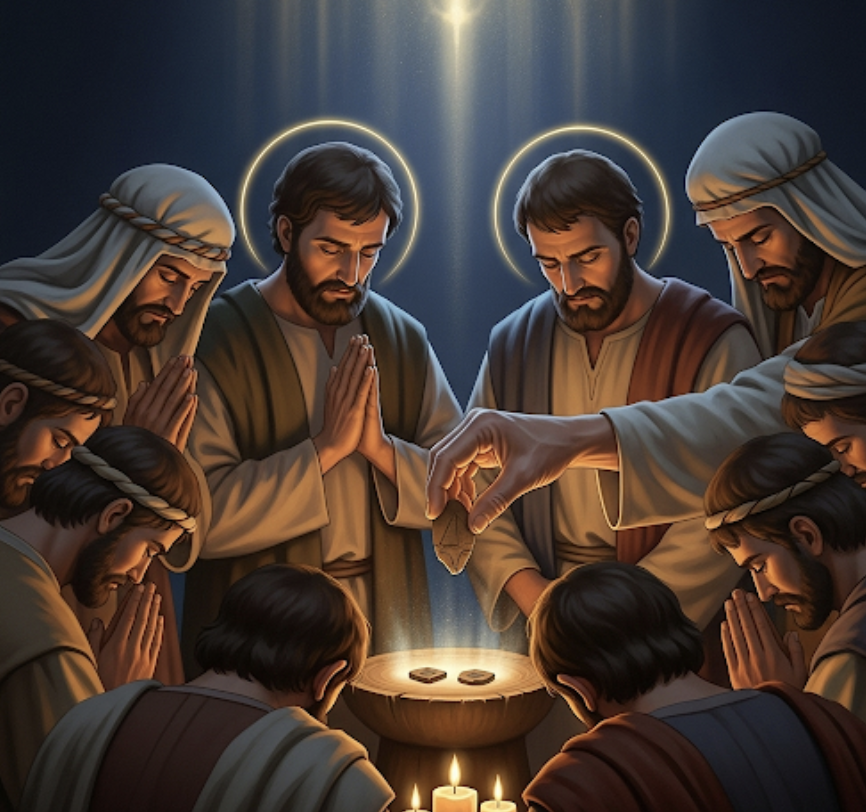Level 1
Building the Gospel’s Voice
(Believers)
In Acts 1:12-26, the disciples prepare to teach about Jesus by uniting in prayer after His ascension. Peter leads them to choose Matthias as a new apostle, using Scripture to replace Judas, ensuring the gospel’s witnesses are ready (vv. 15-26). This moment builds a foundation for proclaiming Jesus’ life, death, and resurrection. For you, it’s a call to pray, seek God’s guidance, and join in sharing His transforming story with the world.
Preparing the Witnesses for Mission
(Scholars / Pastors)
Acts 1:12-26 delineates the critical period of the early church's formation following Christ's ascension and prior to Pentecost. This passage is foundational for Teaching About Jesus and the Gospel, as it highlights the meticulous divine preparation of credible witnesses for the impending global mission. The disciples’ communal unity in prayer (Acts 1:14), including women and Jesus's brothers, underscores a Spirit-generated cohesion. Peter’s leadership in reconstituting the apostolic band, driven by prophetic fulfillment and stringent eyewitness criteria, ensured the authority of their future message. The selection of Matthias by divine discernment, even through the casting of lots, completed the foundational leadership, demonstrating God's sovereign hand in establishing the right infrastructure for The Holy Spirit's Role-empowered launch of The Great Commission amidst Christianity Accepted and Opposed
Level 2
Building the Gospel’s Voice
(Believers)
Acts 1:12-26 lays a critical foundation for the apostles’ teaching about Jesus and the gospel, showing how they prepare to proclaim His story. After Jesus ascends, about 120 disciples return to Jerusalem, gathering in an upper room to pray “with one accord” (v. 14), including women and Jesus’ brothers. This unity isn’t just practical—it’s the seedbed for their future witness, setting the stage for Pentecost’s bold proclamation (Acts 2:32-36).
Peter steps forward, addressing Judas’ betrayal with solemn resolve. He turns to Psalm 69:25 and 109:8 (vv. 16-20), showing God’s plan endures despite human failure. The need for a new apostle arises—someone who witnessed Jesus’ ministry from baptism to resurrection (v. 22)—to ensure the gospel’s truth, rooted in 1 Corinthians 15:3-8’s eyewitness accounts. They nominate Joseph Barsabbas and Matthias, pray for God’s choice (v. 24), and cast lots (v. 26), trusting Proverbs 16:33’s promise of divine direction. Matthias joins the twelve, symbolizing the church’s readiness to teach.
For you, this is a model. The disciples’ prayer reflects a reliance on God, much like seeking His wisdom in a tough decision—perhaps choosing a ministry role. Their use of Scripture guides your study, preparing you to share Jesus’ life and victory. The restored twelve prepare you to tell His story—start with a friend, pray for courage, and trust God’s timing to equip you for this mission.
The Assembly in Anticipation:
Forging the Foundation for Global Witness
(Scholars / Pastors)
Acts 1:12-26 provides a pivotal theological and ecclesiological interlude between Christ's ascension and the Spirit's transformative descent at Pentecost. This pericope is crucial for understanding the meticulous divine preparation of the apostolic witness, which formed the bedrock of Teaching About Jesus and the Gospel. It illustrates The Holy Spirit's Role in implicitly orchestrating communal cohesion and discerning divine will, ensuring the right infrastructure was in place for the audacious launch of The Great Commission.
The passage commences with the disciples' return to Jerusalem from the Mount of Olives, adhering to Christ's command to “wait for what the Father had promised” (Acts 1:4). Luke meticulously details their composition: the eleven apostles, along with faithful women, Mary the mother of Jesus, and His brothers (Acts 1:13-14). The inclusion of Jesus’s previously skeptical brothers signifies a Spirit-generated unity and transformation within this foundational group, reflecting the compelling reality of the resurrection that transcended familial skepticism. Luke emphasizes their disposition: “These all with one accord were devoting themselves to prayer” (προσκαρτεροῦντες ὁμοθυμαδὸν τῇ προσευχῇ) (Acts 1:14). This corporate posture of unified, persistent prayer is not mere human piety but a divinely enabled cohesion, serving as a precondition for the Spirit's reception and the launch of the global mission.
Within this context of prayerful expectation, Peter assumes a prominent leadership role, guiding the community toward the necessary reconstitution of the apostolic band to its full number of twelve. His discourse (Acts 1:16-22) is a remarkable example of early Christian hermeneutics, seamlessly integrating Old Testament prophecy with contemporary events. Peter argues that Judas’s betrayal and demise were a fulfillment of Scripture (Psalm 69:25; 109:8), demonstrating God’s sovereign hand even in human apostasy and sin. This understanding of Prophecy Fulfillment underscores the divine order being re-established. The stringent criteria for Judas’s replacement—one who had consistently accompanied Jesus “all the time that the Lord Jesus went in and out among us—beginning with the baptism of John until the day that He was taken up from us” and who could become an eyewitness “of His resurrection” (Acts 1:21-22)—highlights the unique, foundational nature of the apostolic office. This office required direct, verifiable historical testimony to Christ’s entire earthly ministry, particularly His resurrection, which formed the bedrock of Teaching About Jesus and the Gospel.
The process of selection itself, involving the nomination of Joseph Barsabbas and Matthias, culminates in an appeal to divine discernment through corporate prayer: "You, Lord, who know the hearts of all men, show which one of these two You have chosen to take the place in this ministry and apostleship..." (Acts 1:24-25). The subsequent casting of lots (Acts 1:26), a practice rooted in Old Testament tradition for discerning divine will (e.g., Proverbs 16:33), signifies the Spirit's implicit guidance in their choice prior to His full indwelling. This divinely guided selection ensured the completion of the twelve-member apostolic college, symbolically and functionally ready as the infrastructure for the coming Spirit-empowered era of The Great Commission. This meticulous preparation of the human infrastructure—a full and authoritative set of eyewitnesses—was essential for the explosive growth and challenges of Christianity Accepted and Opposed that would characterize the gospel's global reach, highlighting a profound Connecting Acts to the Rest of the NT.
Level 3
Building the Gospel’s Voice
(Believers)
Acts 1:12-26 is a deliberate preparation for the theme of Teaching About Jesus & the Gospel, establishing the apostles as credible witnesses to proclaim Christ’s life, death, resurrection, and identity as the Messiah. After Jesus’ ascension (Acts 1:9), the disciples return to Jerusalem, obediently awaiting the Spirit (Acts 1:4). This passage reveals the Spirit’s unseen work, fostering unity, grounding decisions in Scripture, and ensuring the church is ready to teach the gospel—a mission that will erupt at Pentecost (Acts 2:22-36). For you, seeking to deepen your faith, this is a call to see your role in this ongoing story, equipped by God’s Word and Spirit.
Unity in Prayer: The Foundation for Teaching
The disciples, about 120 strong, gather in an upper room, praying “with one accord” (v. 14), joined by women and Jesus’ brothers—once skeptics (John 7:5). This unity fulfills Jesus’ prayer for oneness (John 17:21) and echoes Psalm 133:1’s blessing. The Spirit, though unnamed, is the bond, preparing them to proclaim the gospel (Acts 2:42). Historically, this reflects the early church’s inclusivity, a model for your community today.
For you, this is a revelation: prayer unites. When you join others in seeking God—perhaps in a church prayer meeting—the Spirit strengthens your witness. The disciples’ wait prepares you to teach Jesus’ story with a united heart.
Scriptural Guidance: Preparing the Message
Peter addresses Judas’ betrayal, citing Psalm 69:25 (“Let his habitation be desolate”) and 109:8 (“Let another take his office”) (vv. 16-20). The Spirit, who inspired these psalms (2 Peter 1:21), guides Peter, showing God’s sovereignty over evil (Romans 8:28). Judas’ fall, foretold in Zechariah 11:12-13, serves the gospel’s advance. The need for a new apostle ensures the twelve—eyewitnesses to Jesus’ resurrection (1 Corinthians 15:5)—can teach His victory (Acts 2:32).
For you, this is an “aha” moment: Scripture is the Spirit’s tool. In life’s challenges, let His Word shape your understanding, preparing you to share Jesus’ life and saving work.
Discernment and Restoration: Equipping the Witnesses
Peter sets a high standard: the new apostle must have been with Jesus from baptism to ascension (v. 22), securing the gospel’s credibility. They nominate Joseph Barsabbas and Matthias, pray “Lord, you know everyone’s heart” (v. 24), and cast lots (v. 26), trusting Proverbs 16:33’s promise. Matthias restores the twelve, symbolizing the church as God’s renewed Israel (Revelation 7:4-8), ready to teach.
The Spirit’s guidance is implicit, aligning their choice with God’s plan for the mission (Acts 1:8). For you, this is a guide: pray, set godly standards, and trust the Spirit in decisions—whether choosing a path or serving others.
Theological Connections
Messianic Witness: The twelve reflect Jesus’ authority (Matthew 19:28), preparing to teach His lordship.
Kingdom Preparation: Unity and discernment build the church to proclaim Luke 4:43’s kingdom.
Salvation’s Foundation: The resurrection witness prefigures Romans 10:14’s call to preach.
Historical Context
Written around AD 60-62, Acts 1 captures a world of Roman roads and Jewish synagogues, where the disciples’ preparation mirrors Israel’s reliance on God (1 Samuel 16:7). Their unity equips them for the gospel’s spread.
Living It Out
Pray Together: Seek unity with others, letting the Spirit prepare you.
Study Scripture: Use it to guide your witness, as Peter did.
Trust His Choice: In decisions, pray and rely on the Spirit’s lead.
Share the Gospel: Tell Jesus’ story—start locally, pray globally.
Acts 1:12-26 builds the gospel’s voice, readying you to teach Jesus’ transforming truth with faith and purpose.
Apostolic Formation in Anticipation:
The Spirit's Role in Establishing Credible Witness
(Scholars / Pastors)
Acts 1:12-26 delineates a pivotal and often overlooked period in Luke’s theological history, representing the immediate aftermath of Christ’s ascension and the precise preparatory phase for the Spirit’s Pentecostal advent. While the overt outpouring of The Holy Spirit's Role is yet to come, this pericope is deeply imbued with pneumatic significance, illustrating the Spirit's implicit, sovereign work in forming and ordering the nascent Christian community. For scholars and pastors, this passage offers crucial insights into the Spirit's role in communal cohesion, discerning divine will, and establishing apostolic authority, all of which are indispensable for the effective launch of The Great Commission. This period demonstrates the seamless continuity of God’s redemptive plan, ensuring the right infrastructure and personnel were in place for the global mission that would define Teaching About Jesus and the Gospel.
1. Communal Unity in Prayer: A Spirit-Generated Cohesion (Acts 1:12-14)
Following Christ's ascension from the Mount of Olives, the disciples, in obedience to His command to “wait for what the Father had promised” (Acts 1:4), returned to Jerusalem. Luke meticulously details their composition: the eleven apostles, along with faithful women, Mary the mother of Jesus, and His brothers (Acts 1:13-14). The inclusion of Jesus’s previously skeptical brothers (cf. John 7:5) signifies a profound transformation and Spirit-generated unity within this foundational group, reflecting the compelling reality of the resurrection that transcended familial skepticism. The presence of women, historically marginalized in ancient patriarchal societies, further underscores the inclusive nature of the Spirit’s work in forming the new community, which would radically redefine social structures and challenges for Christianity Accepted and Opposed. This early demonstration of diverse inclusion sets a precedent for the church’s universal mission.
The collective disposition of this assembly is powerfully emphasized by Luke: “These all with one accord were devoting themselves to prayer” (προσκαρτεροῦντες ὁμοθυμαδὸν τῇ προσευχῇ) (Acts 1:14). The term homothumadon (ὁμοθυμαδὸν, “with one accord” or “with one mind”), a recurring Lukan leitmotif in Acts, signifies a profound, Spirit-generated unity, solidarity, and common purpose. This corporate posture of unified, persistent prayer is not mere human piety but a divinely enabled cohesion, serving as a vital precondition for the Spirit's reception and the subsequent launch of The Great Commission. It reflects a conscious recognition of absolute dependence on divine power and guidance, modeling the essential spiritual discipline foundational to the church's vitality. This period of intense supplication highlights the Spirit's unseen work in preparing hearts and minds, creating a unified vessel ready to receive and steward the promised dunamis. This cohesion, fostered by the Spirit, would be vital as they faced the formidable challenges of proclaiming Teaching About Jesus and the Gospel in a hostile world.
2. Apostolic Succession: Discerning Divine Order and Establishing Credible Witness (Acts 1:15-22)
Within this context of prayerful expectation and communal unity, Peter emerges as the authoritative spokesman, signaling his nascent leadership among the apostles, a role anticipated by Christ Himself (Matthew 16:18). Addressing a congregation of “about one hundred and twenty persons” (Acts 1:15), Peter guides them toward the necessary reconstitution of the apostolic college. His discourse (Acts 1:16-22) is a remarkable example of early Christian hermeneutics, seamlessly integrating Old Testament prophecy with contemporary events to justify the critical necessity of restoring the number of the Twelve.
Peter argues that Judas’s betrayal and demise were a fulfillment of Scripture (Psalm 69:25; 109:8), demonstrating God’s sovereign hand even in human apostasy and sin. This understanding of Prophecy Fulfillment underscores the divine order being re-established, even through tragic circumstances. The stringent criteria for Judas’s replacement—one who had consistently accompanied Jesus “all the time that the Lord Jesus went in and out among us—beginning with the baptism of John until the day that He was taken up from us” and who could become an eyewitness “with us of His resurrection” (Acts 1:21-22)—highlights the unique, foundational nature of the apostolic office. This office required direct, verifiable historical testimony to Christ’s entire earthly ministry, particularly His resurrection, which formed the bedrock of Teaching About Jesus and the Gospel. The Spirit's implicit guidance in establishing these criteria ensured the integrity and authenticity of the apostolic witness, validating the message they would carry. This emphasis on factual, eyewitness testimony provides robust Apologetic Support for the Christian message.
3. The Divinely Guided Choice: Matthias and the Completed Foundation (Acts 1:23-26)
The process of selection, involving the nomination of Joseph Barsabbas (also called Justus) and Matthias, culminates in a profound appeal to divine discernment through corporate prayer: "You, Lord, who know the hearts of all men, show which one of these two You have chosen to take the place in this ministry and apostleship from which Judas turned aside to go to his own place" (Acts 1:24-25). This prayer acknowledges God’s omniscience and His sovereign prerogative in choosing His appointed servants for such a pivotal office. The subsequent casting of lots (Acts 1:26), a practice rooted in Old Testament tradition for discerning divine will (e.g., Proverbs 16:33), signifies The Holy Spirit's Role in guiding their choice in the absence of the Spirit’s full indwelling at Pentecost. This was not a random gamble but a method of deferring the ultimate decision to God’s sovereignty in a unique transitional phase of redemptive history.
The outcome—Matthias being “added to the eleven apostles”—completed the symbolic and functional reconstitution of the twelve-member apostolic college. This divinely guided selection ensured that the foundational leadership was complete and sanctioned by God before the empowering descent of the Holy Spirit. This meticulous preparation of the human infrastructure—a full and authoritative set of eyewitnesses, representative of the new Israel—was essential for the explosive growth and challenges of Christianity Accepted and Opposed that would characterize The Great Commission's global reach. The unity displayed in this process, guided by Peter’s discerning leadership, further highlights Connecting Acts to the Rest of the NT, demonstrating the Spirit's work in establishing canonical continuity and order for Christ's continuing work through His church. The precise and intentional formation of this apostolic foundation was crucial for the accurate and authoritative transmission of Teaching About Jesus and the Gospel to all nations.




